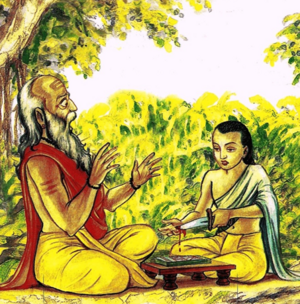Talk:Scholars of Hindu Languages, Arts & Law:How Pāṇini Became a Great Scholar
By Vishal Agarwal
Once, Pāṇini Muni went to a palmist to get his hand read for determining his future. The palmist said to him, “You are fated to be an illiterate fool because the line of education is missing from your palm.”
Pāṇini asked him, “Tell me where that line is.” When the palmist answered his question, Pāṇini took a knife and carved the line at that place on his palm. He then decided to give up his laziness and worked hard to learn the grammar of the Saṃskṛta (Sanskrit) language.
After some time, he wrote the book Aṣṭādhyāyī, which is considered one of the greatest works of Saṃskṛta grammar even today — 2500 years after Pāṇini lived. His grammar consists of just about 4000 short sentences called sūtras, which can be easily memorized by students.
It consists of eight chapters, of which two deal with the grammar of the Vedic scriptures, and the rest with the grammar of spoken Saṃskṛta and the language of other Śāstras. His grammar has six appendices, some of which are said to have been composed by other scholars. It is regarded as the most scientific and systematic grammar known among all the languages of the world.
There is a very interesting story about how Pāṇini died. He was teaching his students in an open-air classroom when suddenly a lion arrived and started roaring. All the students ran away. But Pāṇini was so dedicated that he said to the students, “The roar of the lion is very interesting. Let me teach you how the sounds can be analyzed using the rules of Saṃskṛta grammar.” Unfortunately, the lion did not want to learn grammar, and he killed and ate Pāṇini.
But Pāṇini's book on grammar became very famous. Almost 1000 years later, a Chinese traveler named Hiuen Tsang visited his birthplace, Sālātura, and saw a memorial that people had raised in his honor.
Pāṇini's life shows that we must not get disheartened when someone tells us, You cannot do it because you do not have the intelligence.With hard work, we can all overcome our weaknesses to become wise and knowledgeable.

